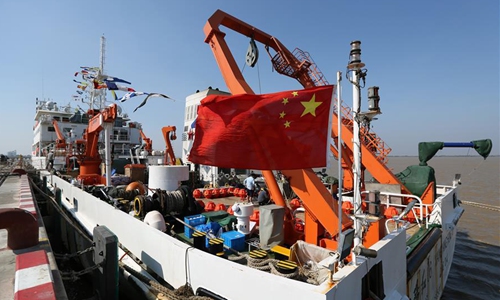HOME >> OPINION
Myanmar’s support amid epidemic solidifies its deep China ties
By Zhu Feng and Cheng Hanping Source:Global Times Published: 2020/2/16 18:22:01

Chinese research vessel Xiangyanghong 06 arrives at Myanmar's Thilawa port in Yangon on Thursday to conduct a joint research in Myanmar's waters. Photo: Xinhua
As China goes all out to contain the novel coronavirus epidemic and some countries had evacuated their citizens, suspended flights and exaggerated the crisis, a launch ceremony for the China-Myanmar 2020 joint scientific survey of Myanmar's waters was held on Thursday, at Myanmar's Thilawa port in Yangon. This is the first major bilateral cooperation project launched by the two sides since President Xi Jinping's successful visit to Myanmar in January. It is a true reflection of the solid progress of the China-Myanmar community with a shared future.
During Xi's visit to Myanmar, the two countries agreed to jointly build a China-Myanmar community with a shared future, which received a positive response from all walks of life in Myanmar. Today, the epidemic fight has solidified the friendship between China and Myanmar. After the novel coronavirus epidemic broke out in Wuhan, Central China's Hubei Province, YTV, one of the television channels in Myanmar, produced a seven-minute video to cheer for and support Wuhan and China, which touched the hearts of millions of the Chinese people.
During China's fight against the epidemic, the world has seen this scenario: Chinese builders worked day and night at "Chinese speed" to set up, in just over 10 days, two large-scale high-level specialist hospitals which were designated to treating novel coronavirus patients in critical conditions. The world knows it was a feat only China could accomplish.
The Chinese government has mobilized tens of thousands of medical workers to respond to the emergency. They headed into the eye of the storm without regard for their personal safety, validating the spirit of unity and mutual assistance of the Chinese nation during times of crisis.
The quarantine of Wuhan, the epicenter of the epidemic which has a population of more than 10 million, has been accomplished with the understanding cooperation of the city's people. While the city has been locked down, its order has been maintained and basic supplies largely ensured.
To reduce the losses and impact caused by the epidemic on companies that have been required to suspend production, relevant Chinese authorities launched a series of effective measures, including tax breaks, rent reductions, delayed payments, loans and other support measures that will provide an important foundation for their recovery after the outbreak.
To ensure the health of students, China's education authorities have suspended classes and organized online lessons so that children can continue their studies at home. Government organs are also using the internet to serve the people.
Areas outside of Wuhan have seen a decline in the number of newly confirmed cases in recent days, indicating that the country is accelerating toward an inflection point. It is only a matter of time before the Chinese government and the Chinese people completely defeat the novel coronavirus, just as it defeated the SARS virus in 2003.
The Chinese government has organized a number of video conferences to review the problems existing in Wuhan's handling of the epidemic and draw lessons. After the defeat of the virus, the Chinese government will share these experiences and lessons with neighboring countries, including Myanmar, without reservation, helping them to improve the capacity and governance level to cope with emergencies.
There is a saying in China: After the storm comes the rainbow. It's hoped the epidemic will soon be a thing of the past, and China's economy will continue to be the engine of world economic growth. At that time, China and Myanmar will step up the construction of the China-Myanmar economic corridor and give full play to their cooperation.
Zhu Feng is director of Institute of International Relations, Nanjing University. Cheng Hanping is senior research fellow and professor at the Collaborative Innovation Center of South China Sea Studies, Nanjing University. opinion@globaltimes.com.cn
Posted in: ASIAN REVIEW